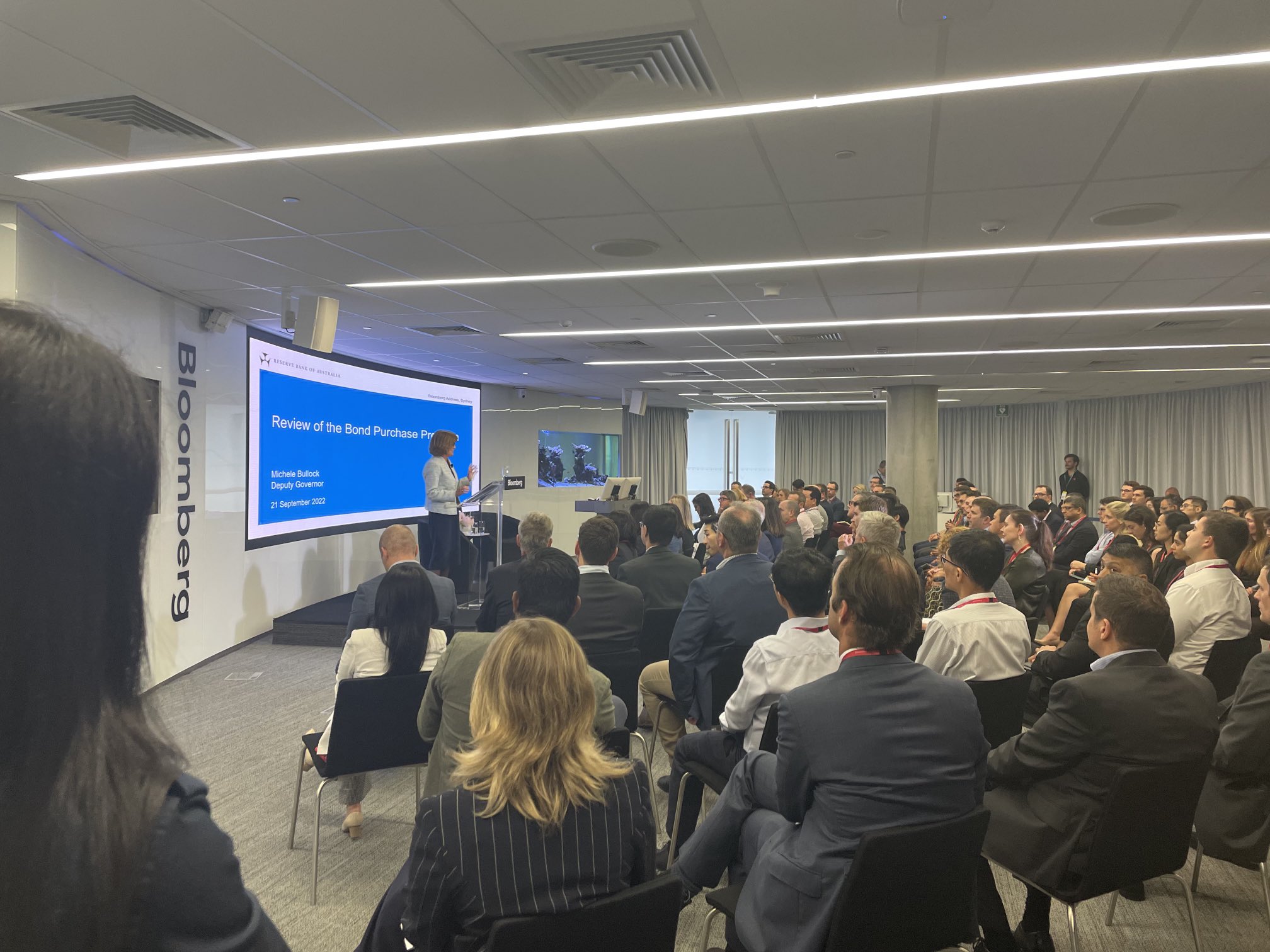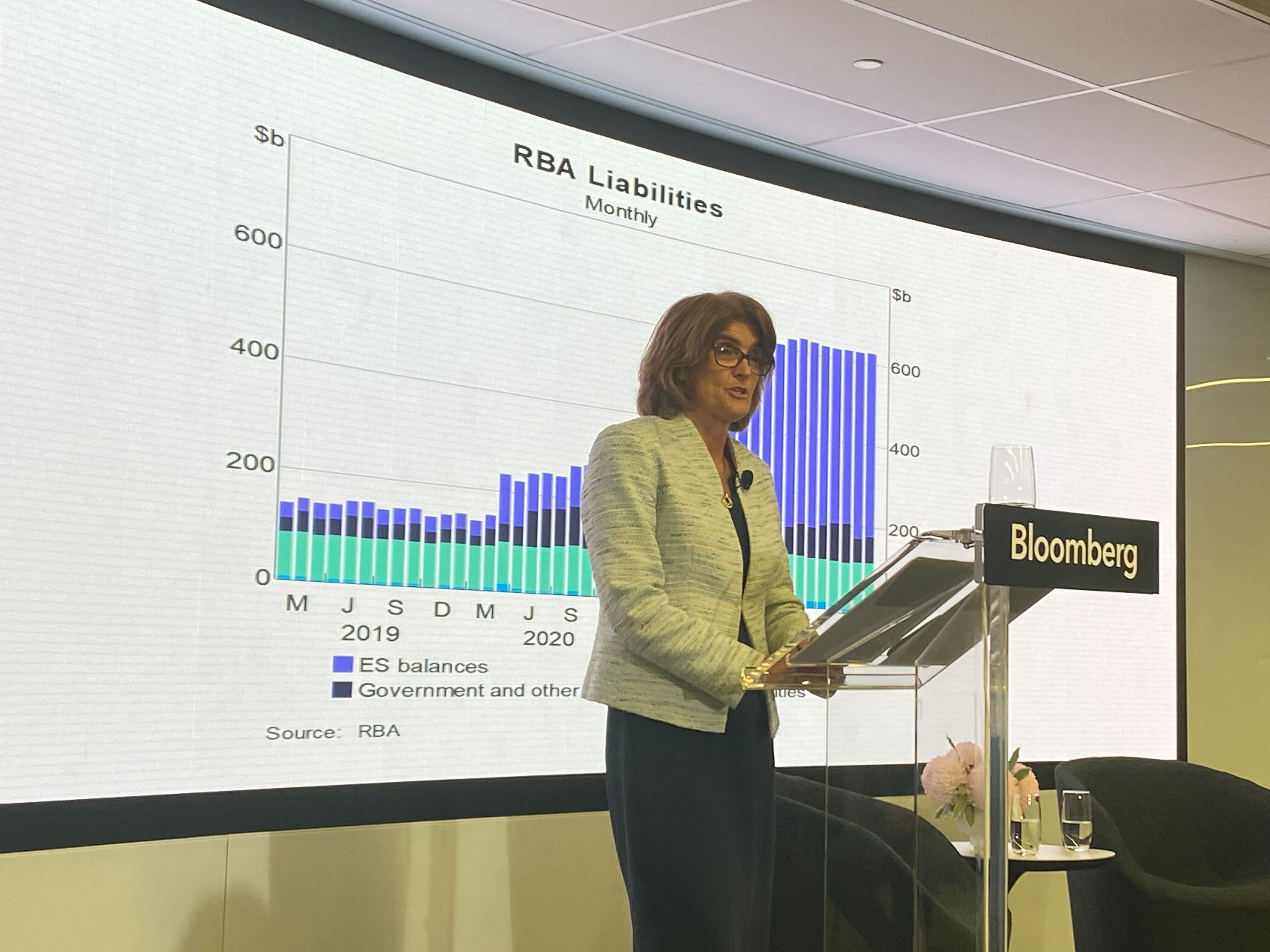China is not Australia's biggest uncertainty: RBA's Bullock
The term "free money" has been everywhere in financial markets for most of the last two years. Its genesis comes from the fact that central banks pumped enormous amounts of liquidity into the global financial system. It did this by buying billions in sovereign bonds, which depresses yields but also reduces the cost of borrowing for the major financial institutions of the world. It was their version of "whatever it takes".
But as we now know with hindsight's benefit, "whatever it takes" didn't have just one meaning - it had two.
The second of these meanings is the meaning that financial markets are faced with right now. After all the extra money was created, how do you take it out?
The evolution of this process was the subject of Reserve Bank deputy governor Michele Bullock's speech at the recent Bloomberg Address. The address covered everything from "what happened" to "what it means for the Bank's future". I was fortunate enough to receive an invitation to the Sydney-based event earlier this week and even got to ask a couple of questions on your behalf.

The 60-second explainer of the BPP
The bond purchase program (BPP) was the second in a four-part package of changes the RBA made in March 2020 to keep the economy afloat. The idea was that the Reserve Bank bought a slew of fixed income instruments per week to keep debt servicing costs low. For most of the program's life, the purchases were made at a rate of $5 billion per week. In September 2021, they cut that back to $4 billion per week. By February 2022, the purchases stopped altogether and interest rate rises came soon after.
The final amount purchased by February 2022 was a whopping $281 billion. It's this $281 billion that was the subject of this address - not just how they are going to deal with it but what they are going to do with it.
Lessons from the program's two-year run
Bullock argued that there were four key lessons as a result of the program. It did lower bond yields across the Australian curve, which is what the Bank intended. She also said that the program allowed the Australian economy to keep ticking despite the initial and aftershocks of the COVID-19 pandemic.
"It is clear that the BPP, along with other policy measures, contributed to a strong recovery in economic activity and a sharp drop in unemployment."
Bullock isn't wrong - unemployment is at 50-year lows and GDP growth remains positive. Slim but positive, and that's more than can be said for other economies around the world.
The third and fourth outcomes are most relevant to the way the Bank works. The internal review concluded the BPP allowed the ship to keep sailing. Even as more bonds were purchased, "there was no negative impact on functioning more generally". However, it also created a giant hole in the Reserve Bank's financial accounts. This year, Bullock said the Reserve Bank will record a $21 billion loss on its books. As the bonds it purchased mature, those losses will likely balloon. Their estimate is for the accounting loss to come in just under $60 billion by 2033.
So how will it end?
This is where the Reserve Bank is doing things differently from the Federal Reserve in the US. While both did purchase insane amounts of government bonds, the "runoff" process of how those bonds will mature and disappear from the system will differ. The Federal Reserve uses a timed structure - up to US$95 billion a month will "runoff" from its balance sheet. The Reserve Bank, in total contrast, is choosing to let go of its bonds naturally.
Or put another way, if the bonds they bought mature in 2033 (for example), that's when they will leave the Reserve Bank's balance sheet.
I asked Bullock a question about whether that maturity should be done naturally or whether the Bank should move to a more active system (ala the Federal Reserve). She said the Board did consider its prospects but eventually decided otherwise.
Firstly, it's "at the margin". We're not constrained on the upside like we are on the downside - we couldn't lower the interest rate any further but we can move the interest rate up. That is the main tool. That's why we haven't categorically ruled out, but we have no plans to sell before maturity.
And will it ever come back...?
In the post-address interview, Bullock answered a question from Bloomberg's Swati Pandey about whether we'd ever see unconventional policy tactics like the BPP ever be used again. Bullock said she wouldn't say no forever, but that it wouldn't be an everyday feature either.
"I wouldn't say they are absolutely zero, but one of the conclusions the Board has drawn from the experience is it's only for use in extraordinary circumstances. It's only for use when the cash rate has no gas left in the tank [sic]."

Bullock's comments on more omnipresent issues
The next set of responses will feature Michele's verbatim responses to some of the audience's questions about the big issues in markets beyond the BPP's review. Top of mind for market participants will be Australia's first monthly inflation print at the end of next week.
While it's only a partially accurate print, everyone (i.e. me and the other economists out there) is very excited that the ABS Is finally moving into monthly data reporting after decades of quarterly headlines. But Bullock says she will not be swayed by this inaugural report.
"I think there's a little water under the bridge to go for monthly CPI figures. I think everyone will be looking at them and trying to figure out what is the noise, and what is the information. I'm not so sure we'll be looking at monthlies immediately."
The RBA will next update its inflation forecast in the November Statement on Monetary Policy. Speaking of inflation, the topic de jour which always follows is the debate over whether the Reserve Bank is near its peak for the rate hiking cycle. After a little hesitation, Bullock admitted she does not know where neutral lies at the moment.
"I'm not sure it's necessarily in restrictive territory yet but it is evident that we had to get it up from the very low levels that it was at ... we'll be looking to see whether there are opportunities to taper and slow the pace a bit."
On the global front, Bullock admitted she was "concerned" about the state of the Chinese economy given the country's ongoing zero-COVID policy and the property crisis which it needs to address (perhaps as soon as next month at the National People's Congress). But, she also said it may not turn out to be the Australian economy's biggest unknown.
"Internationally, I think [it's not just China] the biggest risk is you have rising interest rates in Europe and the US. The US has excess demand and it's trying very hard to bring that down. Europe has got its own problems. It has inflation but also a massive energy shock which will impact their production. Those two things plus China, I think, the outlook for the world economy is looking quite uncertain and quite worrying."
Conclusion
I also asked a question about how the Reserve Bank calculated its best and worst-case scenarios for this runoff process. While the numbers are easy to find, and the calculations easy to read, the impacts of either situation will be huge on financial markets. But Bullock told me that it's not all about the future cost - choosing instead to emphasise what good the program did for the economy despite how much it will set the Bank back later on.
"One thing I would point out though - the economy, because of all these extraordinary measures, has done very, very well. I think I saw this morning in the paper that the Budget deficit is looking better this year. One of the reasons is that welfare payments are down because unemployment is at its lowest level in 50 years. The bond purchase program helped to contribute to that. Just considering the financial loss in isolation isn't particularly helpful. I think you have to think about it across the economy."
So optimism is the name of the central bank's game. The easy part for financial markets to understand is that there are more rate hikes along the way. But sometimes, it's the operations in the background that end up meaning the most to investors even if it is not immediately obvious. This may turn out to be one of these teaching moments.
Note: Bloomberg has uploaded the full address and Q&A to its YouTube channel. You can access the full discussion here.
Never miss an insight
If you're not an existing Livewire subscriber you can sign up to get free access to investment ideas and strategies from Australia's leading investors.
I'll be in charge of asking the questions to Australia's best strategists, economists, and fixed income fund managers. If you have questions of your own, flick us an email: content@livewiremarkets.com
3 topics

